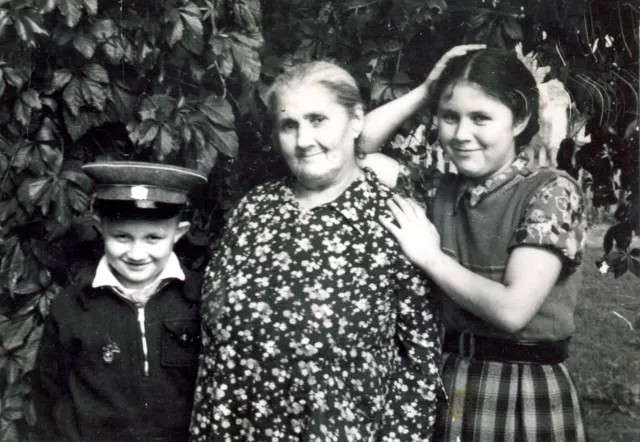This is me in a performance at the Jewish theater in Dnepropetrovsk, playing the part of Tevie's daughter in the play Tevie, the Dairyman by Sholem Aleichem in 1938.
In 1938 I went to work in the Jewish theater in Dnepropetrovsk. My husband also went to work there as a producer.
My favorite part was the role of a girl in the play of the Jewish poet and playwright Perets Markish, 'Feast.' It was a tragedy, set in Ukraine in the 1910s, during pogroms. There is no need to retell the content of the play. I would only say that I played the part of the Jewish girl who was forced to dance before she was killed by pogrom-makers. The director of that play decided to invite a ballet master who would work with me on that dance. I objected saying that his guidance would be no good here and asked to be allowed to dance the part myself. I didn't even rehearse that dance, I improvised on the stage, when the tragic music started playing. I was a leading actress of the theater and played mostly tragic parts. I was happy that I didn't have to play comic roles. I felt happy that spectators would forget about their problems thanks to my work.
I lived in Dnepropetrovsk before 1939. It was a hard time for the people of the Soviet Union. It was the time of the Great Terror and everybody was worried for the lives of their loved ones. I probably understood it even sharper than others. Others were raised by that regime and for them it was dear and impeccable, but I was an onlooker. Yes, I was scared. I understood that I might fit in the role of the spy, and thus be an 'enemy of the people.' I was born in Poland, came to the USSR from Germany and could be either a German or Polish spy, which was fraught with arrest.
Now I think that my life was protected by God. Every time when there were hardships He protected me.
Amalia Blank and her partner in the Jewish theater in Dnepropetrovsk
The Centropa Collection at USHMM
The Centropa archive has been acquired by the United States Holocaust Memorial Museum in Washington, DC. USHMM will soon offer a Special Collections page for Centropa.
Academics please note: USHMM can provide you with original language word-for-word transcripts and high resolution photographs. All publications should be credited: "From the Centropa Collection at the United States Memorial Museum in Washington, DC".
Please contact collection [at] centropa.org (collection[at]centropa[dot]org).
















